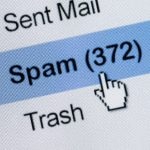Top tips regarding opening email in your spam folder
Email is a potential gateway for cyberattacks. You should therefore be careful when opening any messages. Those emails sitting in the spam or junk folder, though, are the most dangerous of all.

What is spam, exactly?
The spam folder contains messages that tend to be “blanket emails” sent automatically and without authorization to a mass audience who has not asked for them. They can become quite annoying. In fact, this word “spam” has its origins in the second world war when Soviets and Americans sent the famous canned ham product “Hormel's Spiced Ham” to family members serving in the war. The acronym, “spam” was popularized by a Monty Python sketch in 1970 in which parts of the cast repeatedly chant “SPAM! SPAM! SPAM!” making fun of the fact that the indistinguishable meat product was found in every dish on the menu.
Spam messages: a gateway for phishing attacks
Unfortunately, spam mails are not just an annoyance, but they can also be dangerous because some have attachments with viruses that run upon being downloaded. Scammers may also use hoaxes or phishing to try to trick recipients with their spam.
Spammers usually get email addresses by attacking Internet services, in fake raffles or giveaways created specifically for this purpose, or buying them on the black market.

Steps to take to avoid becoming a phishing victim
- Never open email in the spam folder if you are not sure that it comes from a trusted source and wound up in the spam folder by accident.
- If there is any question about who the sender is, use some other means to contact the person or the known entity (by telephone, for example) to verify whether or not they have sent the message.
- Do not reply to spam messages.
- Do not click on links or images contained in spam emails.
- Do not download attachments from spam emails.
- Be careful when participating in raffles or giveaways: if they are not organized by a trusted source and publicized via official channels, it’s wise not to participate.
- If you receive unwanted “spam” from a company for whom you are customer (and it has been confirmed that this company has sent the mail), you will need to tell the company that you no longer want to receive these kind of emails. If you are besieged by annoying advertisements, you can report the sending company. Depending on where you live, it is illegal to send advertising without the recipient's prior consent.
Keep these top tips in mind when it comes to the email in your spam folder, and you’ll avoid unnecessary scares.